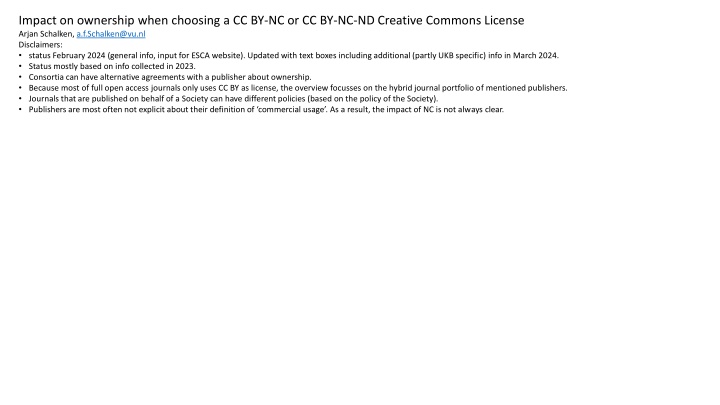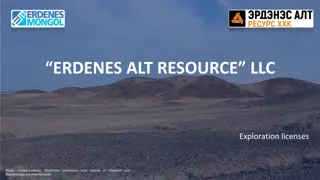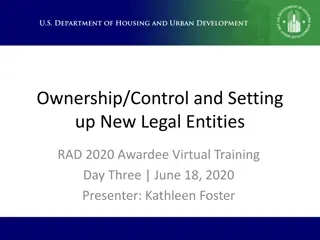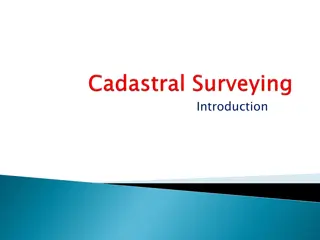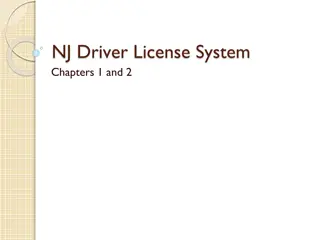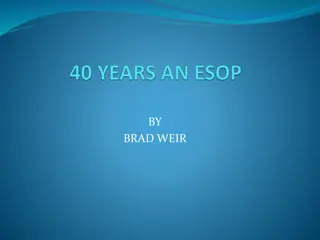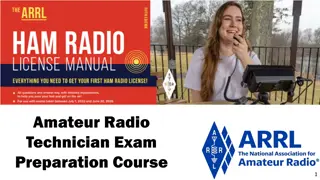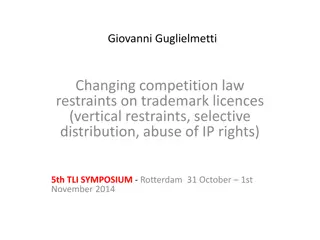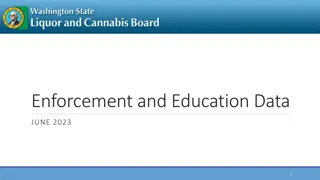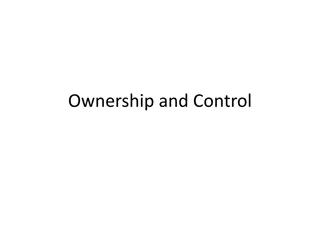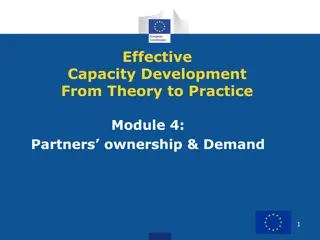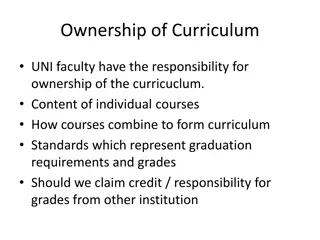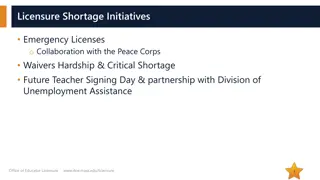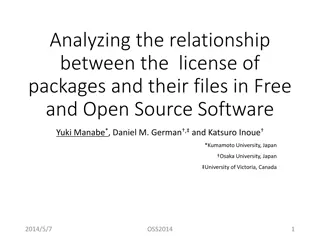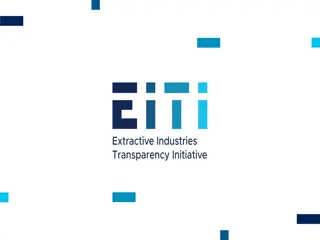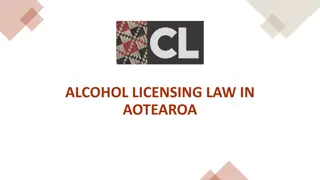Impact of CC BY-NC or CC BY-NC-ND Licenses on Ownership
Understanding the impact on ownership when choosing between CC BY-NC or CC BY-NC-ND Creative Commons licenses in academic publishing. Different publishers have varying policies on ownership transfer, re-use rights, and commercial usage. Authors may need to consider these factors carefully before selecting a license for their work.
Uploaded on Sep 21, 2024 | 0 Views
Download Presentation

Please find below an Image/Link to download the presentation.
The content on the website is provided AS IS for your information and personal use only. It may not be sold, licensed, or shared on other websites without obtaining consent from the author.If you encounter any issues during the download, it is possible that the publisher has removed the file from their server.
You are allowed to download the files provided on this website for personal or commercial use, subject to the condition that they are used lawfully. All files are the property of their respective owners.
The content on the website is provided AS IS for your information and personal use only. It may not be sold, licensed, or shared on other websites without obtaining consent from the author.
E N D
Presentation Transcript
Impact on ownership when choosing a CC BY-NC or CC BY-NC-ND Creative Commons License Arjan Schalken, a.f.Schalken@vu.nl Disclaimers: status February 2024 (general info, input for ESCA website). Updated with text boxes including additional (partly UKB specific) info in March 2024. Status mostly based on info collected in 2023. Consortia can have alternative agreements with a publisher about ownership. Because most of full open access journals only uses CC BY as license, the overview focusses on the hybrid journal portfolio of mentioned publishers. Journals that are published on behalf of a Society can have different policies (based on the policy of the Society). Publishers are most often not explicit about their definition of commercial usage . As a result, the impact of NC is not always clear.
Publisher Position author Position Publisher Position user Remarks Elsevier Author is obligated to transfer ownership of license to publisher. Author becomes user. Owner of the license. Has right to re-use the article regardless license restrictions. Can also sell the right for commercial re-use to user. Publisher doesn t consult author before selling re-use right to commercial party. User (including the author) who wants to commercially re-use the article and/or make derivatives, needs to submit a requests to the publisher. Elsevier uses an online marketplace to sell re-use rights. Authors who want to re-use their own article commercially and/or make derivatives need to request Elsevier for permission. As of 2024 Elsevier offers CC BY-NC as additional restrictive option to CC BY-NC-ND for all its journals. Elsevier considers Massive Open Online Courses (MOOCS) as commercial. S/N Author is obligated to transfer ownership of license to publisher. Author becomes user. Owner of the license. Has right to re-use the article regardless license restrictions. Can also sell the right for commercial re-use to user. Publisher doesn t consult author before selling re-use right to commercial party. User (including the author) who wants to commercially re-use the article and/or make derivatives, needs to submit a requests to the publisher. 2% of S/N journals offer a CC BY-NC as default. The other 98% S/N journals have CC BY as default. Wiley Author is obligated to transfer ownership of license to publisher. Author keeps rights for commercial re-use and making derivatives, with some restrictions. Owner of the license. Has right to re-use the article regardless license restrictions. Can also sell the right for commercial re-use to user. Publisher doesn t consult author before selling re-use right to commercial party. Publisher also gets the exclusive rights to the shared pre-print / accepted manuscript. User who wants to commercially re-use the article and/or make derivatives, needs to submit a requests to the publisher. Author doesn t become a user (see position author ). In case of an ND license the author has the right to re-use Article Figures, Tables, Artwork and Selected Text up to 250 words. Author can give colleagues, professional societies and academic institutions the right to sell the article but only in the context of a course pack that is sold as hardcopy by an academic copy shop, or a society that sells a curated collection as part of a conference. The right for commercial re-use (by for example pharmaceutical company) can only be given by the publisher. T&F Author is obligated to transfer ownership of license to publisher. Author keeps rights for commercial re-use and making derivatives for own use. Owner of the license. Has right to re-use the article regardless license restrictions. Can also sell the right for commercial re-use to user. Publisher requests author for permission to sell re-use right to commercial party. User who wants to commercially re-use the article and/or make derivatives, needs to submit a requests to the publisher. Author doesn t become a user (see position author ). <comment for ESAC: T&F states in feedback that permission from the author for commercial re-use is required but there is no clear process description on the T&F website> Sage Author is obligated to transfer ownership of license to publisher. Author becomes user. Owner of the license. Has right to re-use the article regardless license restrictions. Can also sell the right for commercial re-use to user. Publisher doesn t consult author before selling re-use right to commercial party. User (including the author) who wants to commercially re-use the article and/or make derivatives, needs to submit a requests to the publisher. Sage considers distribution of the content to promote or market a person, product, course, service or organization as commercial use for which permission by Sage is required. ACS <comment for ESAC: not part of UKB survey because in our current contract all articles have CC BY as default> OUP Author is obligated to transfer ownership of license to publisher. Author keeps rights for own commercial re-use (not by for- profit publisher or commercial organization) and making derivatives for own use. Owner of the license. Has right to re-use the article regardless license restrictions. Can also sell the right for commercial re-use to user. Publisher doesn t consult author before selling re-use right to commercial party. User who wants to commercially re-use the article and/or make derivatives, needs to submit a requests to the publisher. Author doesn t become a user (see position author ). <comment for ESAC: OUP labels its license to publish as confidential. This obstructs transparany>
Publisher Position author Position Publisher Position user Remarks Elsevier Author is obligated to transfer ownership of license to publisher. Author becomes user. Owner of the license. Has right to re-use the article regardless license restrictions. Can also sell the right for commercial re-use to user. Publisher doesn t consult author before selling re-use right to commercial party. User (including the author) who wants to commercially re-use the article and/or make derivatives, needs to submit a requests to the publisher. Elsevier uses an online marketplace to sell re-use rights. Authors who want to re-use their own article commercially and/or make derivatives need to request Elsevier for permission. As of 2024 Elsevier offers CC BY-NC as additional restrictive option to CC BY-NC-ND for all its journals. Elsevier considers Massive Open Online Courses (MOOCS) as commercial. S/N Author is obligated to transfer ownership of license to publisher. Author becomes user. keeps rights for own use. Elsevier gets rights for 3rd parties Owner of the license. Has right to re-use the article regardless license restrictions. Can also sell the right for commercial re-use to user. Publisher doesn t consult author before selling re-use right to commercial party. User (including the author) who wants to commercially re-use the article and/or make derivatives, needs to submit a requests to the publisher. request license change CC BY-NC / NC-ND to CC BY 2% of S/N journals offer a CC BY-NC as default. The other 98% S/N journals have CC BY as default. New policy (concept): NC can be used for non-commercial MOOCs New policy (concept): author New UKB agreement: author can Wiley Author is obligated to transfer ownership of license to publisher. Author keeps rights for commercial re-use and making derivatives, with some restrictions. Owner of the license. Has right to re-use the article regardless license restrictions. Can also sell the right for commercial re-use to user. Publisher doesn t consult author before selling re-use right to commercial party. Publisher also gets the exclusive rights to the shared pre-print / accepted manuscript. User who wants to commercially re-use the article and/or make derivatives, needs to submit a requests to the publisher. Author doesn t become a user (see position author ). In case of an ND license the author has the right to re-use Article Figures, Tables, Artwork and Selected Text up to 250 words. Author can give colleagues, professional societies and academic institutions the right to sell the article but only in the context of a course pack that is sold as hardcopy by an academic copy shop, or a society that sells a curated collection as part of a conference. The right for commercial re-use (by for example pharmaceutical company) can only be given by the publisher. T&F Author is obligated to transfer ownership of license to publisher. Author keeps rights for commercial re-use and making derivatives for own use. Owner of the license. Has right to re-use the article regardless license restrictions. Can also sell the right for commercial re-use to user. Publisher requests author for permission to sell re-use right to commercial party. User who wants to commercially re-use the article and/or make derivatives, needs to submit a requests to the publisher. Author doesn t become a user (see position author ). <comment for ESAC: T&F states in feedback that permission from the author for commercial re-use is required but there is no clear process description on the T&F website> Sage Author is obligated to transfer ownership of license to publisher. Author becomes user. Owner of the license. Has right to re-use the article regardless license restrictions. Can also sell the right for commercial re-use to user. Publisher doesn t consult author before selling re-use right to commercial party. New UKB contract: In case the Eligible Author prefers to publish under a more restrictive Creative Commons license (CC BY-NC, CC BY-ND or CC BY-NC-ND or another NC/ND variant), the Author will not be under any obligation to license the commercial or derivative rights reserved under the restrictive license to the Publisher. The Publisher will clearly inform the Submitting Author that in case the author(s) choose(s) to publish under a restrictive CC license, the commercial and/or derivative rights are retained by the Eligible Authors, without the obligation to license these rights to the Publisher. Status implementation will be checked in April User (including the author) who wants to commercially re-use the article and/or make derivatives, needs to submit a requests to the publisher. Sage considers distribution of the content to promote or market a person, product, course, service or organization as commercial use for which permission by Sage is required. New UKB contract: CC BY = default, option to choose restrictive license. ACS <comment for ESAC: not part of UKB survey because in our current contract all articles have CC BY as default> OUP Author is obligated to transfer ownership of license to publisher. Author keeps rights for own commercial re-use (not by for- profit publisher or commercial organization) and making derivatives for own use. Owner of the license. Has right to re-use the article regardless license restrictions. Can also sell the right for commercial re-use to user. Publisher doesn t consult author before selling re-use right to commercial party. User who wants to commercially re-use the article and/or make derivatives, needs to submit a requests to the publisher. Author doesn t become a user (see position author ). <comment for ESAC: OUP labels its license to publish as confidential. This obstructs transparany>
Publisher Position author Position Publisher Position user Remarks CUP Author gives publisher a non- exclusive licence to publish, reproduce, distribute, and sell the publication, or any part of it. Publisher has the non-exclusive right to publish, reproduce, distribute and sell the publication, or any part of it. Publisher manages the license. User (including the author) who wants to commercially re-use the article and/or make derivatives, needs to submit a requests to the publisher. <comment to ESAC: a non-exclusive right, suggests that not only the publisher but also the author can grant users the right to commercially re- use the article and/or make derivatives.> CUP explicitly mentions sharing on social media as commercial usage LWW Author is obligated to transfer ownership of license to publisher. Author becomes user. Owner of the license. Has right to re-use the article regardless license restrictions. Can also sell the right for commercial re-use to user. Publisher doesn t consult author before selling re-use right to commercial party. User (including the author) who wants to commercially re-use the article and/or make derivatives, needs to submit a requests to the publisher. RSC Author is obligated to transfer ownership of license to publisher. Author becomes user. Owner of the license. Has right to re-use the article regardless license restrictions. Can also sell the right for commercial re-use to user. Publisher doesn t consult author before selling re-use right to commercial party. User (including the author) who wants to commercially re-use the article and/or make derivatives, needs to submit a requests to the publisher. RSC doesn t use ND , only CC BY-NC as restrictive license. Karger Author is obligated to transfer ownership of license to publisher. Author becomes user. Owner of the license. Has right to re-use the article regardless license restrictions. Can also sell the right for commercial re-use to user. Publisher doesn t consult author before selling re-use right to commercial party. User (including the author) who wants to commercially re-use the article and/or make derivatives, needs to submit a requests to the publisher.
Publisher Position author Position Publisher Position user Remarks CUP Author gives publisher a non- exclusive licence to publish, reproduce, distribute, and sell the publication, or any part of it. Publisher has the non-exclusive right to publish, reproduce, distribute and sell the publication, or any part of it. Publisher manages the license. User (including the author) who wants to commercially re-use the article and/or make derivatives, needs to submit a requests to the publisher. <comment to ESAC: a non-exclusive right, suggests that not only the publisher but also the author can grant users the right to commercially re- use the article and/or make derivatives.> CUP explicitly mentions sharing on social media as commercial usage LWW Author is obligated to transfer ownership of license to publisher. Author becomes user. Owner of the license. Has right to re-use the article regardless license restrictions. Can also sell the right for commercial re-use to user. Publisher doesn t consult author before selling re-use right to commercial party. User (including the author) who wants to commercially re-use the article and/or make derivatives, needs to submit a requests to the publisher. RSC Author is obligated to transfer ownership of license to publisher. Author becomes user. Owner of the license. Has right to re-use the article regardless license restrictions. Can also sell the right for commercial re-use to user. Publisher doesn t consult author before selling re-use right to commercial party. User (including the author) who wants to commercially re-use the article and/or make derivatives, needs to submit a requests to the publisher. RSC doesn t use ND , only CC BY-NC as restrictive license. New UKB contract: CC BY = default, no option to choose restrictive license. Karger Author is obligated to transfer ownership of license to publisher. Author becomes user. Owner of the license. Has right to re-use the article regardless license restrictions. Can also sell the right for commercial re-use to user. Publisher doesn t consult author before selling re-use right to commercial party. User (including the author) who wants to commercially re-use the article and/or make derivatives, needs to submit a requests to the publisher.
